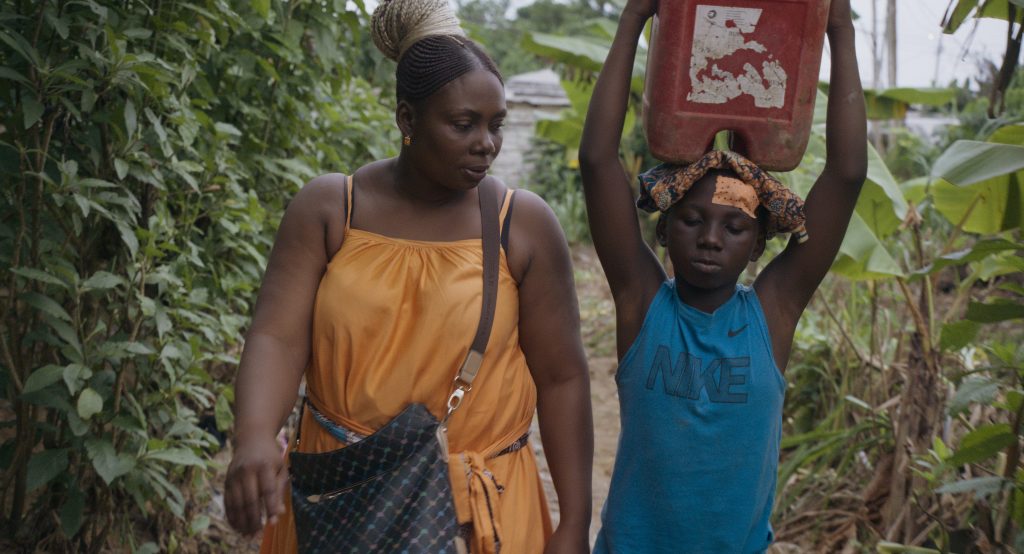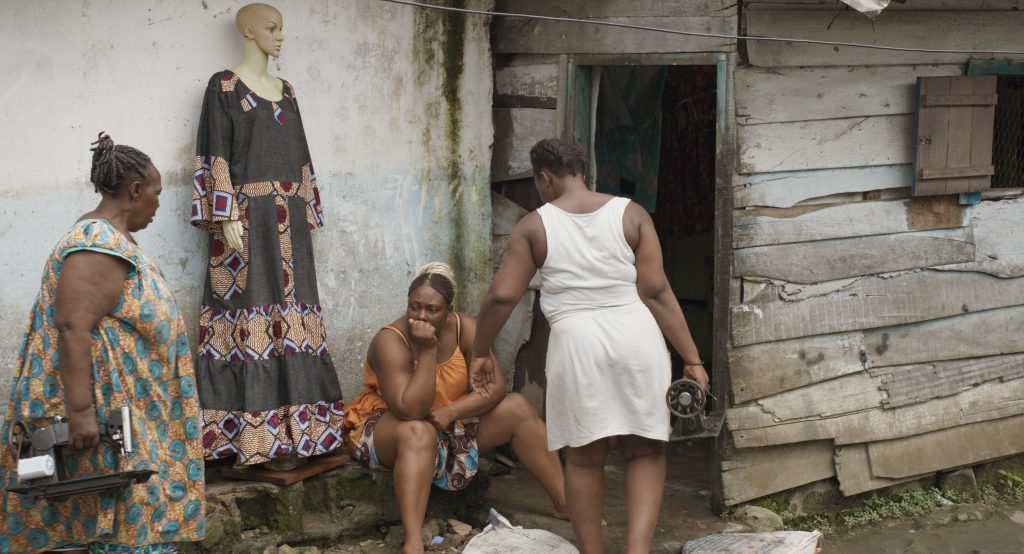“Mambar Pierrette” is a poignant film portrait directed by Cameroonian-Belgian documentary filmmaker Rosine Mbakam making her fiction debut; although it’s more hybrid documentary-fiction. The film is a compelling chronicle of a day in the life of a resilient seamstress named Mambar Pierrette, who navigates the challenges of poverty, patriarchy, and the elements, in the bustling city of Douala, Cameroon. It’s a testament to the strength, resilience, and determination of African women like Mambar, who are single mothers striving to provide for their families amidst adversity.
Rosine Mbakam, known for her documentaries that delve into the lives of African women, brings her documentarian’s patience and observational skills to this feature, blending real-life situations and actors with scripted scenes and dialogues. Some of her previous works include “The Two Faces of a Bamiléké Woman” (2016), which depicts her mother’s life and the impact of French colonization on her culture; “Chez Jolie Coiffure” (2018), which follows a hairdresser from Cameroon who runs a salon in Brussels; and “Delphine’s Prayers” (2019), a portrait of a young woman who survived sexual abuse and trafficking; think Shirley Clarke’s “Portrait of Jason” (1967), but even more heartbreaking — the deep scars of patriarchy laid bare — while still transcendent.
Each authentic and compelling character study explored themes of repression, diaspora, and the struggles of women. And with “Mambar Pierrette,” the filmmaker continues this exploration, focusing on the life of her cousin, Pierrette Aboheu Njeuthat, who delivers a captivating performance as the titular character.

The film’s narrative unfolds slowly, focusing on Mambar’s daily routine, her interactions with her clients, and her struggles to make ends meet. The story is set against the backdrop of the start of the school year, a time fraught with financial stress as Mambar strives to earn enough from sewing school uniforms to afford her own children’s school supplies. The narrative is further complicated by a series of misfortunes, including a robbery and a flood that damages her home and workplace. Yet, Mambar remains resilient, leaning on the bonds she has formed within her community and continuing to work hard despite the setbacks.
Adding another layer of complexity to the film’s backdrop, “Mambar Pierrette” is deeply rooted in its sociopolitical context. Cameroon is a country in Central-West Africa that has a complex history of colonization and political instability. The film shows the diversity and vitality of Douala, the country’s largest city and economic hub, but also its problems and contradictions. It exposes the legacy of colonialism and the current political crisis in Cameroon, where protests and violence have erupted since 2016 over the marginalization of the Anglophone minority.
“Mambar Pierrette” also explores broader issues of poverty and gender inequality in Cameroon, where women face discrimination and oppression, but also resist and assert their agency.
These elements collectively are not merely background details, but integral parts of Mambar’s story, contributing to the challenges she faces. Ultimately, her struggles are not just personal, but also reflective of the systemic issues that many women in Cameroon face.

“Mambar Pierrette” is characterized by its observational approach and its focus on the details of everyday life. The film is shot with a patient, documentarian’s eye, allowing the rhythm of each interaction to set the pace. The camera often focuses on Mambar’s hands as she works, highlighting the physical and personal nature of her work. The sound design is also notable, using only direct sound to create an immersive and realistic soundscape.
Mbakam’s background as a filmmaker and her personal connection to the story adds a layer of authenticity and depth to the film. Born in Cameroon and raised in a traditional Bamiléké family, Mbakam studied film and audiovisual production in Cameroon and Belgium. She co-founded her own production company and has directed several documentaries exploring the experiences of African women. Her personal experiences and insights undoubtedly inform her portrayal of Mambar and the challenges she faces. It’s a testament to the power of cinema to tell stories that are both deeply personal and universally resonant.
“Mambar Pierrette” is likely to resonate with audiences who are interested in stories of resilience and the human spirit. It offers a unique perspective on the lives of African women — one that is often overlooked in mainstream cinema. It’s a film that invites viewers to step into the shoes of its protagonist and experience her world, if only for a brief moment. And through its intimate portrayal of Mambar’s life, it challenges viewers to reflect on their own perceptions, assumptions, and experiences.
“Mambar Pierrette” makes its world premiere in the Directors’ Fortnight strand of the 2023 Cannes Film Festival.
If you appreciate our coverage here and on social media and would like to support us, please consider making a donation today. Your contribution will help us continue to do the work we do in coverage of African cinema and, more importantly, grow the platform so that it reaches its potential, and our comprehensive vision for it. Thank you for your support: https://gofund.me/013bc9f2
